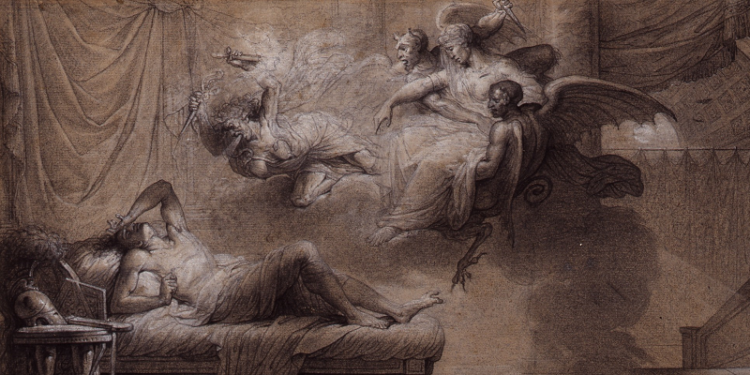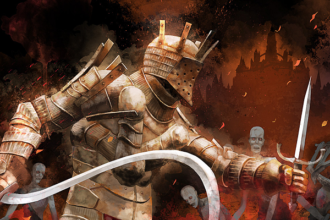Singing Stars, Erinyes, and the Bardic College of Kindly Song

For the second week in a row, I am going to kick off an article with a defense of 4e. I loved the concept of leaders – I liked all the roles, but let’s focus on leader. No longer did groups “require a cleric” in order to adventure, and healing was regulated by healing surge expenditure, so it wasn’t on one character to keep the ball rolling. Clerics healed by the power of the gods, warlords yelled at you to rub dirt on it until you stopped bleeding, shaman threw ghosts at you, and bards sang songs to revitalize you. I might be getting some of that wrong. At any rate, it was 4e that really reimagined the bard into something more palpable than its previous iterations. I mean, EverQuest will always have my preferred bard, but 4e was honestly great with songblades, wands, and lots of group-centric play. At any rate, when I first started dreaming of this Zodiac setting, I immediately knew what I wanted to do with bards. Without further ado, let’s take a look at singing stars, erinyes, and the Bardic College of Kindly Song.
Previous Discussions: The Zodiac and the Celestial Sorcerer | Aberrations and the Circle of the Zodiac Druids | Dendar the Night Serpent and the Path of Nightmares Barbarians | Living Stars, Blazozoids, and Zodiac Patron Warlocks
Aural Astronomy
Everyone has heard the ol’ sci-fi horror adage “in space, no one can hear you scream.” Besides being the tagline of roughly twelve thousand DTV films, it’s also not exactly the truth. While it is true that most of space is a vacuum, there is a meaningful amount – unless you are French-Canadian and round down – of “stuff” floating around. Since the CJA – Cosmic Janitors Association – is on strike, there’s all sorts of gas and dust all over the place. This is often dense enough to carry electromagnetic vibrations – albeit typically imperceptible to human ears. This sound doesn’t extend outside of specific bodies or areas such as a galaxy because of the areas of vacuum, but it’s detectable by other means.
NASA has created specialized instruments to record the electromagnetic waves and translate them into sound. While super cool, the sounds are almost universally terrifying. Earth sounds like a crystal cave full of horrors sounds in one of the better Final Fantasy installments. The sun sounds like it is making a deal with Jean-Baptiste Emanuel Zorg. You could probably make several dope mixes with all of the sounds of the planets in our solar system, honestly.
All Up Erinyes
I love the erinyes – also known as the Furies. I also love Nemesis. Maybe that means I just like vengeance. I am not sure whether or not I am okay with that. I don’t want to rehash everything I have said about them in the past, but I need to dive into them a little bit to frame this archetype. If you are interested, read the linked article. I loved writing the series as a whole – and can return to it if people want me to cover something specific – but I am particularly proud of that one. Anyway, a brief refresher doesn’t hurt.
To sum up, the erinyes are a collective of maiden goddesses relating to vengeance and curses brought upon yourself. While there were initially any number of erinyes, Virgil – with the assist from Alexandrian works – popularized the notion of three of them. These were Alecto (endless), Megaera (jealous rage), and Tisiphone (vengeful destruction.) It is likely Tisiphone is actually the goddess Demeter – given that another name for Tisiphone is Tilphousia, and Demeter was worshiped as Erinys in Thelpousa.
These goddesses pre-date the rest of the Hellenic gods, hailing from Erebus. Erebus, as we all know, is a primordial deity who roughly translates to “deep darkness,” and is seen as the personification of darkness. Erebus is also a place, often used interchangeably with Tartarus. The dead pass through there immediately after dying. While this was first described as being “between earth and Hades,” it’s not difficult to imagine space as a reasonable stand in for this darkest darkness. This becomes even easier to imagine when you take into account the nature of prayer and the duties of the erinyes.
Singing Stars, Erinyes, and the Bardic College of Kindly Song
The erinyes are charged with hearing the complaints of mortals. Every time the children complain about parents, villages grieve about their town council, hosts bitch about their guests, and so on, the erinyes listen. They listen to complaints and judge the crimes committed. The erinyes mercilessly torment anyone they find guilty, whipping them with their brass-studded scourges until they die in agony. Of course, just looking at them was terrifying – snake-hair, skin carrying the legacy of Erebus, bat wings, and dog heads. If that doesn’t scream “terrifying visage of angels from beyond the stars,” I don’t know what does.
One of the most interesting things to me is that they exist in heaven, hell, and on earth – albeit with different names. One of those names is “the Kindly Ones,” owing to the fact that – like with Hades/Pluto being called “the Rich One” – to say their name was to attract their attention. In order to keep them in your favor, it was wise to lavish praise upon them. In fact, with enough praise and respect, they can even become agents of judgment rather than agents of blood and vengeance.
Taken all together you have a plethora of maiden goddesses who hear every bit of scandalous gossip and petty complaint, need compliments heaped upon them, exist within the deepest darkness, are instruments of vengeance and justice, and the stars themselves whisper into the void. Is it hard to imagine the erinyes are these stars, singing their songs of vengeance and justice, sharing what they know with those who would listen, wishing only for the world to know and praise them? Not for me, at least.
College of Kindly Song
Bards of the College of Kindly Song spend their evenings as many do – gazing up at the stars. Like others, they share their hopes and fears with the night – professing love, whispering their secrets, crying over their losses. However, the bards know something that others do not. When you speak to the stars, they listen. What’s more, they talk back.
The Kindly Ones – servants of the Zodiac – live within the stars, listening to the prayers, whispers, and plaintiff cries of those who lodge complaints against others. They sing songs of vengeance and justice to any who would listen to them. They would carry out their verdicts in person if it were not for the bards of the College of Kindly Song. The bards do so in their stead, serving as wandering officials and judges for communities, traveling in circuits dictated by the college.
All the while, the bards sing songs praising the Kindly Ones, thanking them for the wisdom and prosperity they bring to the land. Legend has it if the bards ever cease their songs, the Kindly Ones will return to the world and the bloody vengeance they once meted out upon the judge.
| Bard Level | Feature |
| 3rd | Arms of the Justiciar, Fighting Style, Kind Words |
| 6th | Verdict |
| 14th | Confess |
Arms of the Justiciar
Starting at 3rd level, you gain proficiency in your choice of great axe or maul. While using the weapon you become proficient in, you may use your Charisma modifier, instead of your Strength, to determine attack and damage rolls. You may use this weapon as a spellcasting focus for your bard spells.
Fighting Style
At 3rd level, you adopt a style of fighting as your specialty. Choose one of the following options. You can’t take a Fighting Style option more than once, even if something in the game lets you choose again.
Defense. While you are wearing armor, you gain a +1 bonus to AC.
Great Weapon Fighting. When you roll a 1 or 2 on a damage die for an attack you make with a melee weapon that you are wielding with two hands, you can reroll the die and must use the new roll, even if the new roll is a 1 or a 2. The weapon must have the two-handed or versatile property for you to gain this benefit.
Kind Words
When you join the College of Kindly Song at 3rd level, you gain the ability to speak with the Kindly Ones in the stars, allowing them to share their wisdom with you in exchange for your praise.
As a bonus action, you can expend one use of your Bardic Inspiration to repeat a secret shared with you by the Kindly Ones. When you do so, choose a number of creatures you can see and that can see you within 60 feet of you, up to a number equal to your Charisma modifier (minimum of one). These creatures gain resistance to the next attack that hits them before the start of your next turn. In addition, when an attack is resisted as a result of this feature, the attacker suffers your proficiency bonus in psychic damage.
Verdict
Upon reaching 6th level, you have been taught how to judge those around you. When you hit with a melee attack, you may render a verdict.
Guilty. You can expend one bard spell slot to deal damage to the target and creatures in the surrounding area, in addition to the weapon’s damage. Creatures you choose within a 15-foot sphere originating from you must make a Wisdom saving throw. On a failed saving throw, creatures suffer 2d6 psychic damage for a 1st-level being expended, plus 1d6 for each spell level higher than 1st. If you expend a spell slot of 3rd level or higher, creatures who fail the saving throw have their speed become 0 and may not benefit from any bonus to speed until the end of their next turn. On a successful saving throw, creatures suffer half damage.
Innocent. You can expend one bard spell slot to bolster your allies. When you do so, choose a number of creatures you can see and that can see you within 60 feet of you, up to a number equal to your Charisma modifier (minimum of one). These creatures may instantly make a new saving throw against any spell or effect currently affecting them. This new saving throw is made with advantage. For each spell level higher than 1st, each creature gains 5 temporary hit points per level of the spell slot expended.
Edited 2/7/18 20:50 UTC: Changed Guilty’s area to align with Confess to unify beneficial and harmful areas.
Confess
At 14th level, you take upon aspects of the appearance of the Kindly Ones.
As a bonus action, you welcome a portion of the Kindly Ones power into yourself for 1 minute. You create a 15-foot radius sphere centered on you. For the duration, a creature that enters the spell’s area for the first time on a turn or starts its turn there must make a Charisma saving throw. On a failed save, a creature can’t speak a deliberate lie while in the radius, suffering 5d8 psychic damage whenever they tell a lie. You know whether each creature succeeds or fails on its saving throw.
An affected creature is aware of the spell and can thus avoid answering questions to which it would normally respond with a lie. Such a creature can be evasive in its answers as long as it remains within the boundaries of the truth.
Once you have welcomed the Kindly Ones in, you may not do so again until you finish a long rest.
In addition, whenever you take the attack action you deal an additional 2d8 psychic damage when you hit with the weapon chosen in the Arms of the Justiciar feature.



